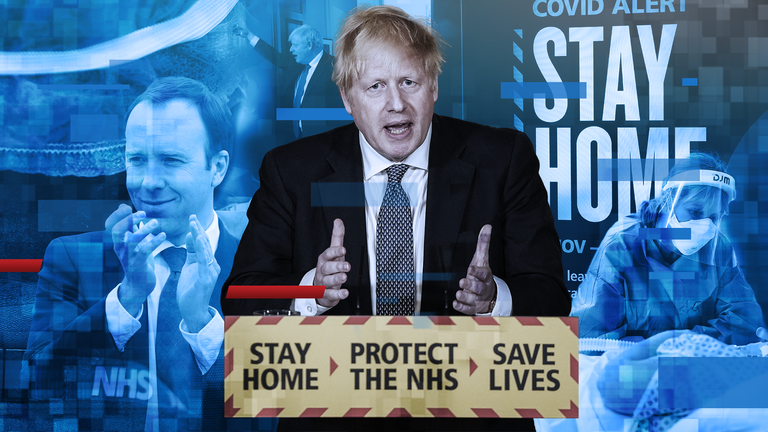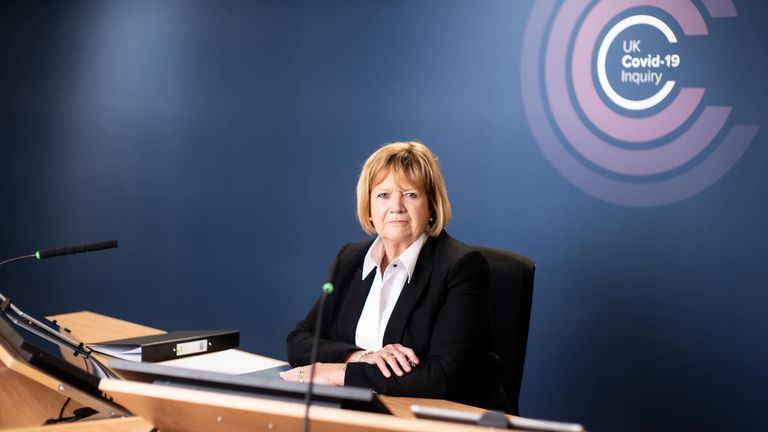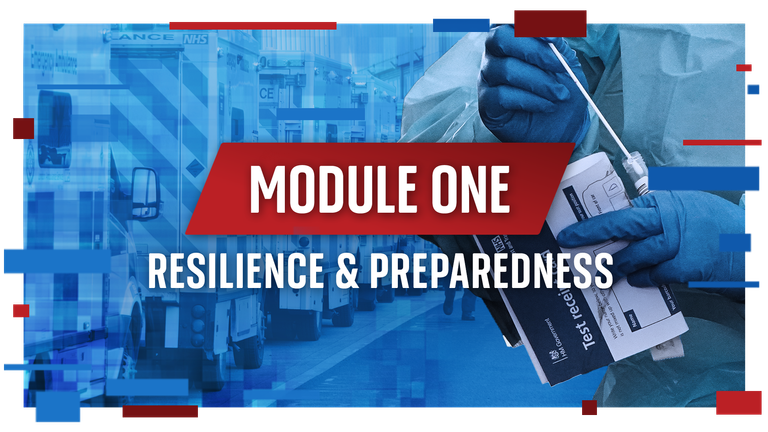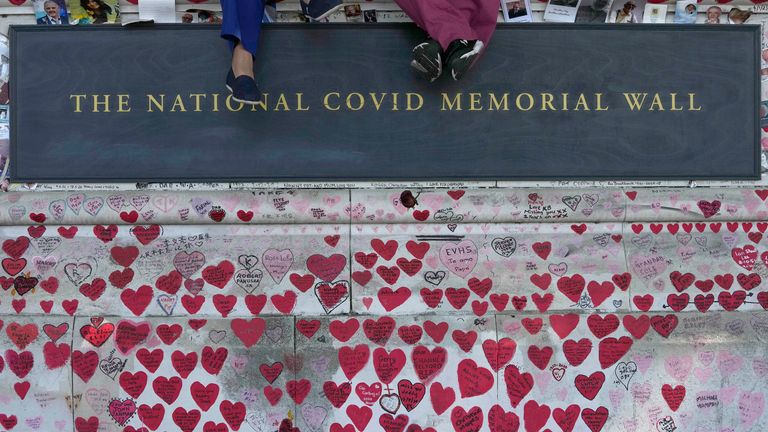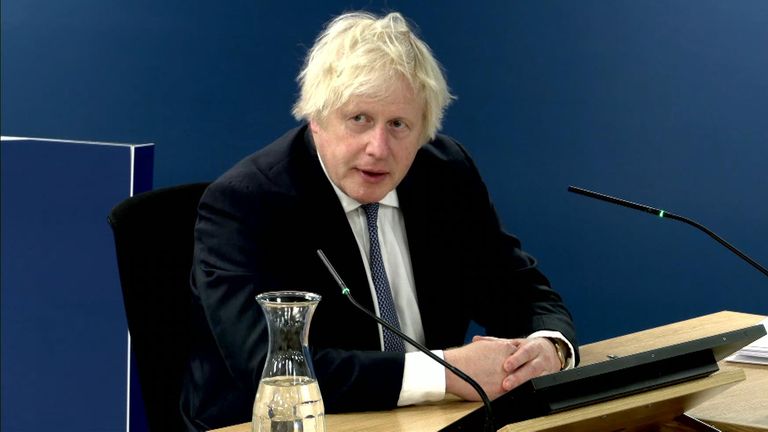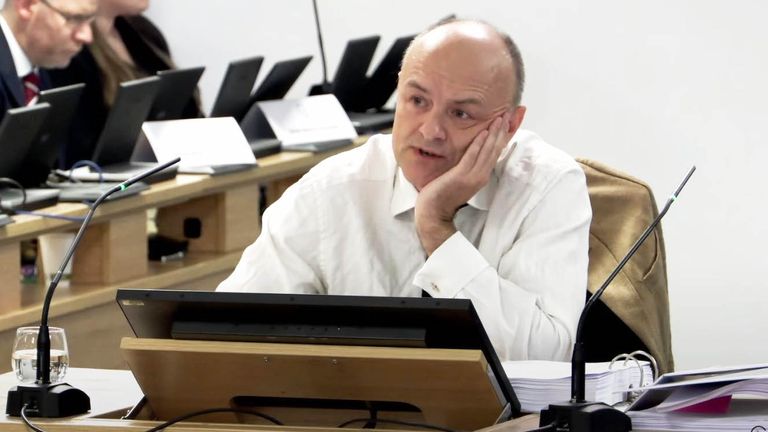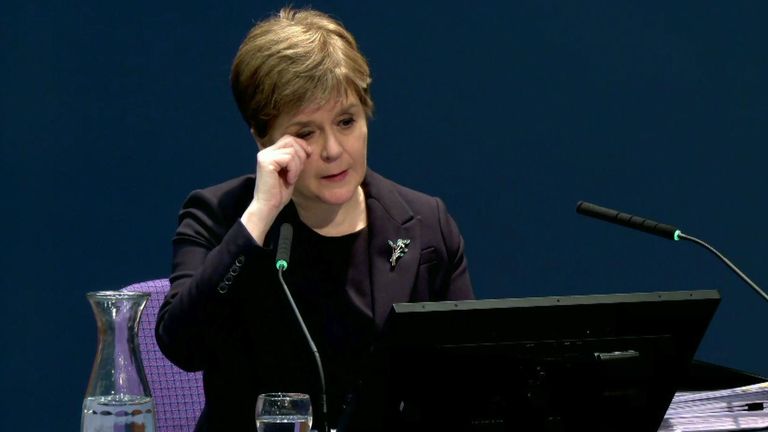Everything you need to know about the COVID inquiry
The COVID inquiry was launched in June 2022, with the first report published in July 2024. It consists of 10 modules, the last of which is due to finish on 5 March 2026.
Monday 29 September 2025 08:38, UK
While the word coronavirus is no longer one we use every day, the inquiry into what happened and how the UK responded to the pandemic is still ongoing.
The mysterious respiratory illness that emerged in Wuhan, China, in late 2019 saw the UK go in and out of unprecedented lockdown restrictions for two years from March 2020.
There were more than 235,000 COVID-related deaths in the UK up until the end of 2023, with many more left bereaved, suffering long-term complications, or financial loss.
The COVID inquiry was set up to scrutinise the decisions made around the virus and the impact they had on day-to-day life throughout the UK.
The next public hearings, for the eighth of 10 modules, begin on 29 September with the full report into the second module set to be published on 20 November.
What is the inquiry trying to achieve - and what powers does it have?
According to the inquiry's terms of reference, the aims are to:
• Examine the COVID-19 response and the impact of the pandemic in England, Wales, Scotland, and Northern Ireland, and produce a factual narrative account
• Identify the lessons to be learned, to inform preparations for future pandemics across the UK
It is a statutory inquiry, as per the Inquiries Act 2005, which means those called to give evidence - either orally or written - are required to do so by law and face criminal action if they refuse
The inquiry does not have the power to bring criminal or civil charges against individuals or organisations but will make recommendations instead. It cannot force the government or other institutions to implement them, however.
It is being chaired by Baroness Heather Hallett, a former Court of Appeal judge who presided over the inquests into the 2005 London terror attack.
Hearings are taking place in public, mainly at Dorland House in London, but where the devolved administrations are concerned, at the Edinburgh International Conference Centre, Mercure Cardiff North Hotel, and the Clayton Hotel in Belfast. They are also streamed live on YouTube.
People can submit their own evidence via the inquiry website's Every Story Matters page. Otherwise, the inquiry contacts participants as it requires.
How long will it go on for?
The inquiry was announced by Boris Johnson during his time as prime minister in May 2021, and officially launched in June 2022 - although public hearings did not get under way until a year later.
The COVID-19 Bereaved Families for Justice campaign group threatened to launch a judicial review over government "time-wasting" after the previous Conservative government refused to hand over some of Mr Johnson's WhatsApps from his time in office.
Ultimately, Mr Johnson decided to hand over the unredacted messages, bypassing an attempt by the Cabinet Office to stop them being used via a judicial review.
Hearings for the last part of the inquiry are due to take place between 18 February and 5 March 2026.
What are the modules?
The inquiry is split into several modules, with interim reports produced at the end of each one.
The first module took place in June and July 2023 and looked at pandemic planning, civil emergency exercises, and how well systems were set up to cope.
Hearings for module two ran between August 2022 and May 2024. It looked at how decisions were made, communicated, recorded, and implemented, as well as how national, devolved, regional, and local governments communicated with each other and collaborated with the voluntary sector.
The report into this module will be published on 20 November 2025.
This module also looked at how laws and guidelines were enforced on lockdowns, shielding, social distancing, face mask-wearing, and test and trace.
Module three ran between September and November 2024, looking at the response of the health and care sector in terms of capacity, resilience, and the delivery of services.
It included emergency and advice services such as NHS 111 and 999, GPs, primary, antenatal, and post-natal care.
Within hospitals, it examined infection prevention and control, intensive, critical, and palliative care, staffing, workforce testing, and the impact on healthcare workers. Another key area was how non-COVID health conditions were impacted. The report for this module is due to be published in spring 2026.
This module covered vaccines - how they were developed by the likes of AstraZeneca, Pfizer, and Moderna, how they were authorised and delivered, as well as any side effects they caused.
Hearings took place in January 2025, with the report due in spring of 2026.
Module five ran in March 2025, looking at how key equipment, including personal protective equipment (PPE) and ventilators were procured and distributed. The report is expected in summer of 2026.
Hearings for this module took place between the end of June and July 2025. It looked at how the pandemic was managed in care homes and other social care settings in terms of infection control, the discharge of patients from hospitals to care homes, transfer of people between their homes and care homes, visiting restrictions, staff testing, and treatment of care home residents.
It also covered social care provided in people's homes - including by unpaid carers.
The hearings for this module in May 2025 looked at COVID testing, contact tracing, and isolation rules, including how they were funded and how technology such as the NHS COVID app was used.
This module will examine the impact of the pandemic on children and young people, namely their mental and physical health, and education or early years provision.
It is expected to run between 29 September and 23 October 2025.
Module nine covers the economic response to the pandemic and its impact. Hearings are due to be held between 24 November and 18 December 2025.
It will look specifically at the coronavirus job retention (furlough) scheme, self-employment income support scheme, and business rate relief, grants, and loans.
How much extra funding various public services and the voluntary sector were given to manage the pandemic will also come under scrutiny here, as well as benefits and sick pay for those unable to work due to COVID sickness, clinical vulnerability, or isolation.
The final module will look at how different parts of society were affected by the virus - at hearings between 18 February and 5 March 2026.
Among these groups will be the retail, hospitality, sport, leisure, and travel sectors, places of worship, cultural institutions, the homeless, those in social housing, and people fleeing domestic abuse.
Prisoners and people held in other places of detention, such as asylum centres, will also come under this module.
It will also look at the bereaved and those impacted by long COVID.
What has been published so far?
The report for the first completed module was published in July 2024. It is 83,000 words long and was compiled using 103,000 submitted documents and 213 witness statements from 68 witnesses.
Ultimately, it concluded that UK citizens were "failed" by the state, namely the "processes, planning and policy of the civil contingency structures within the UK government and devolved administrations and civil services".
It says the government prepared for the "wrong pandemic", by focusing on influenza - not coronaviruses - and had that not been the case some of the "financial and human cost may have been avoided".
Chair Baroness Hallett said: "There were serious errors on the part of the state and serious flaws in our emergency systems." She then warned: "Never again can a disease be allowed to lead to so many deaths and so much suffering."
Among the issues raised were high levels of long-term illness and health inequality in the population, which made them "more vulnerable" to the virus, and public services running "close to, if not beyond capacity".
The report also said that the sole UK pandemic strategy from 2011 was "outdated and lacked adaptability" and therefore "virtually abandoned" as soon as coronavirus emerged.
It criticised politicians and civil servants for submitting to "groupthink".
Ten recommendations were made. They included a radical simplification of systems, holding a UK-wide pandemic response exercise at least every three years, and the creation of a single, independent statutory body responsible for the preparedness and response of the whole system.
The full report into module two will be published on 20 November 2025, with those on modules three and four expected in spring of 2026, and module five next summer.
The dates for publication of the remaining reports are yet to be released.
What have people told the inquiry?
When former Prime Minister Boris Johnson gave evidence in late-2023, he apologised for the "pain and the loss and the suffering" of the pandemic - but was interrupted by protesters who held signs that read: "The dead can't hear your apologies."
He said he takes "personal responsibility for all decisions made", and accepts the government "may have made mistakes", but it did its "level best" to respond well to the virus.
He was asked about meeting notes from 19 March 2020 that saw him question why the government was "destroying everything for people who will die soon anyway", calling them "bed blockers".
In response, he said the messages were not "designed to be publicly broadcast" but showed the "cruelty of the choice we faced" and "appalling balancing act I had to do throughout the pandemic".
Mr Johnson also said "we should have twigged" how serious the virus was before March 2020, apologised for describing long COVID as "b*******", and claimed the way 'partygate' was reported in the media was "dramatic".
Rishi Sunak faced questions about the Eat Out to Help Out scheme he spearheaded as chancellor.
He revealed medical advisers were not consulted, claiming it was a "micro policy" not worthy of scientific consultation.
The former prime minister said he believed "the onus is surely on the people who now believe it was a risk to have raised it at the time" and that he "didn't believe it was a risk" back then.
Former Health Secretary Matt Hancock was asked about leaked footage of him breaking social distancing rules by kissing his then-mistress Gina Coladangelo in Whitehall.
In response, he told the inquiry it is "important that those who make the rules abide by them" and that he "resigned in order to take accountability for my failure to do that".
He said the UK should have locked down "three weeks earlier" than it did, but defended his decision to discharge COVID-positive patients back to care homes.
Former government adviser Dominic Cummings' evidence in November 2023 saw him accuse Downing Street of being in "total chaos" as the virus hit.
He said he warned Mr Johnson that the NHS would implode "like a zombie apocalypse film" 12 days before he implemented lockdown.
Mr Cummings also claimed everyone around Mr Johnson described him as a "trolley" due to his indecision.
He accused Mr Hancock of being a "liar" and described ministers as "useless f***pigs, morons, c****".
Chief medical officer Professor Sir Chris Whitty said the concept of "herd immunity" from COVID was a "clearly ridiculous goal of policy" and "very dangerous" when he gave evidence in late-2023.
He said that comments he made about the public's "behavioural fatigue" around restrictions were his "most prominent error" as they were unfounded.
Asked about Boris Johnson's leadership, he said he had his "own unique style".
Then-deputy chief medical officer Professor Sir Jonathan Van Tam revealed his regular appearances at daily news conferences resulted in "extremely hateful messages" from members of the public.
He said his family were "threatened with having their throats cut" and he "did not expect the police to have to say 'will you move out in the middle of the night for a few days while we look at this and potentially make some arrests'". Ultimately, Professor Sir Jonathan said his family did not leave "because of the cat".
When former Scotland first minister Nicola Sturgeon gave her evidence in 2024, she admitted: "Part of me wishes I wasn't first minister when COVID hit."
She said her "chief regret" was not locking down earlier and responding to WhatsApps that revealed her calling Boris Johnson a "f***ing clown", by saying he was the "wrong person" for the job of prime minister.
WhatsApp messages shown to the inquiry revealed her successor Humza Yousaf joking with a health official that he was "winging it" as Scotland's health secretary during COVID and that he would get "found out sooner or later".
Evidence presented to the inquiry in early 2024 showed former Wales first minister Mark Drakeford and his colleagues "regularly using [WhatsApp] to discuss policy announcements and even to seek clarification on the rules".
When he gave evidence, he likened Mr Johnson to an "absent football manager" in the early days of the pandemic.
When she appeared in 2024, Northern Ireland's First Minister Michelle O'Neill apologised for attending the funeral of her "friend", senior IRA figure Bobby Storey, while lockdown restrictions were in place.
A senior doctor told the inquiry last year that NHS hospitals were like there was a "terrorist attack every day" and some ran out of body bags.
Professor Kevin Fong repeatedly broke down in tears as he recalled his colleagues describing dying patients "raining from the sky".

